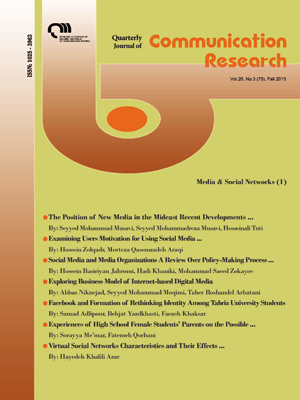امامی، حسین. (1391). نقش عضویت یا عدم عضویت درشبکههای اجتماعی بر روابط میان فردی دانشجویانارتباطات دانشگاه آزاد اسلامی. رساله دکترای علوم ارتباطات. تهران: دانشگاه آزاد اسلامی، واحد علوم و تحقیقات.
خانیکی، هادی و بابایی، محمود. (1391). تأثیر سازوکارهای ارتباطی اینترنت، بر الگوهای تعامل کنشگران فضای سایبر ایران. فصلنامه علمی ـ پژوهشی علوم اجتماعی، 56، صص 116ـ73.
جعفری، مهدی. (1390). هفده میلیون ایرانی عضو فیسبوک هستند. سخنرانی رئیس فنّاوری و اطلاعات سازمان بسیج دانشآموزی کشور در همایش نهضت روشنگری در آمل؛ بازیابی شده از:
www.asriran.com/fa/news/183862/17http://
رجبی، زهره. (1389). بازنمایی گرایشهای سیاسی کاربران ایرانی در شبکههای اجتماعی مجازی: با مطالعه موردی فیسبوک. پایاننامه کارشناسی ارشد علوم ارتباطات. تهران: دانشگاه علامه طباطبایی، دانشکده علوم اجتماعی.
قانون اساسی جمهوری اسلامی ایران. (1392). بازیابی شده از:
http://www.ghavanin.ir/detail.asp?id=5427
کوثری، مسعود. (1386). جهان فرهنگی کاربران ایرانی در شبکه دوستیابی اورکات. تهران: پژوهشگاه فرهنگ، هنر و ارتباطات.
مارشال، کاترین و راسمن، گرچن . (1381). روش تحقیق کیفی (ترجمه علی پارسائیان و سیدمحمد اعرابی). تهران: دفتر پژوهشهای فرهنگی.
نوری مرادآبادی، یونس. (1391). بررسی گرایش دانشجویان دانشگاههای تهران به شبکه اجتماعی فیسبوک و عوامل مرتبط با آن: بررسی تطبیقی دیدگاههای خبرگان رسانه و کاربران فیسبوک.پایاننامه کارشناسی ارشد مدیریت رسانه. تهران: دانشگاه تهران، دانشکده مدیریت.
Alexa. (2013). Retrieved May. 2, 2013, from: http://www.alexa.com/topsites
Allen, S. (2007). Citizen Journalism and the Rise of Mass Self-Communication: Reporting the London Bombings. Global Media Journal (Australian Edition), Vol. 1, No. 1, pp. 238‐266.
Bernet, M. (2010). Social Media in der Medienarbeit: Online-PR im Zeitalter von Google, Facebook und Co. Germany: VS Verlag.
Castells, M. (2007). Communication, Power and Counter‐power in the Network Society. International Journal of Communication, Vol. 17, pp. 238‐266.
Castells, M. (2009). Communicaiton Power. UK: Oxford University Press.
CNN Money .(2012). Facebook Reaches one Billion Users. Retrieved Apr, 5, 2013. from:
http://www.money.cnn.com/2012/10/04/technology/facebook-billion-users/index.html
Facebook. (2013). Retrieved Apr, 7, 2013. from:
http://www.facebook.com/aghuyehamsaade
Garber, M.B. (2011). Social Media Policy on Campus: A Case Study of the Development and Implementation of a Social Media Policy for University Administration, Faculty & Staff. Ph.D Dissertation. Mercer University, Atlanta, GA.
Gordon, R. (2003). The Meanings and Implications of Convergence. In K. Kawamoto (Ed.), Digital journalism: Emerging Media and the Changing Horizons of Journalism. Lanham, MD: Rowman & Littlefield Publishers.
Jenkins, H. (2001). Convergence? I diverge. Technology Review, Vol.5, No. 104, p.93.
Jenkins, H. (2006). Convergence Culture: Where Old & New Media Collide. New Yourk: New York University Press.
Legal Information Institute. (2013). Retrieved May, 11, 2013, Retrieved from: http://www.law.cornell.edu/uscode/text/2/1602
Leonardi, M.E. (2009). Narrative as Self-Performance: The Rhetorical Construction of Identities on Facebook Profiles. Ph.D Dissertation, The University of New Mexico.
Li, C.& Bernoff, J. (2011). Groundswell: Winning in a World Transformed by Social Technologies. Boston: Forrester Research, pp. 30-50.
Shipley, C. (2012). Coining the Term Social Media; Retrieved Jan 25, 2013. from: http://www.en.wikipedia.org/wiki/Chris_Shipley

